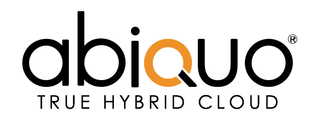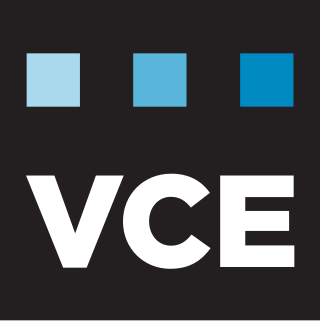
Citrix Systems, Inc. is an American multinational cloud computing and virtualization technology company that provides server, application and desktop virtualization, networking, software as a service (SaaS), and cloud computing technologies. Citrix claims that their products are used by over 400,000 clients worldwide, including 99% of the Fortune 100 and 98% of the Fortune 500.

VMware LLC is an American cloud computing and virtualization technology company headquartered in Palo Alto, California. VMware was the first commercially successful company to virtualize the x86 architecture.

Dell EMC is an American multinational corporation headquartered in Hopkinton, Massachusetts, and Round Rock, Texas, United States. Dell EMC sells data storage, information security, virtualization, analytics, cloud computing and other products and services that enable organizations to store, manage, protect, and analyze data. Dell EMC's target markets include large companies and small- and medium-sized businesses across various vertical markets. The company's stock was added to the New York Stock Exchange on April 6, 1986, and was also listed on the S&P 500 index.

Broadcom Inc. is an American multinational designer, developer, manufacturer, and global supplier of a wide range of semiconductor and infrastructure software products. Broadcom's product offerings serve the data center, networking, software, broadband, wireless, storage, and industrial markets. As of 2023, some 79 percent of Broadcom's revenue came from its semiconductor-based products and 21 percent from its infrastructure software products and services.
In computing, virtualization is the use of a computer to simulate another computer. The following is a chronological list of virtualization technologies.

VMware ESXi is an enterprise-class, type-1 hypervisor developed by VMware, a subsidiary of Broadcom, for deploying and serving virtual computers. As a type-1 hypervisor, ESXi is not a software application that is installed on an operating system (OS); instead, it includes and integrates vital OS components, such as a kernel.

Nicholas (Nick) William McKeown FREng, is a Senior Fellow at Intel, a professor in the Electrical Engineering and Computer Science departments at Stanford University, and a visiting professor at Oxford University. He has also started technology companies in Silicon Valley.
In computing, the term remote desktop refers to a software- or operating system feature that allows a personal computer's desktop environment to be run remotely from one system, while being displayed on a separate client device. Remote desktop applications have varying features. Some allow attaching to an existing user's session and "remote controlling", either displaying the remote control session or blanking the screen. Taking over a desktop remotely is a form of remote administration.
VMware Infrastructure is a collection of virtualization products from VMware. Virtualization is an abstraction layer that decouples hardware from operating systems. The VMware Infrastructure suite allows enterprises to optimize and manage their IT infrastructure through virtualization as an integrated offering. The core product families are vSphere, vSAN and NSX for on-premises virtualization. VMware Cloud Foundation (VCF) is an infrastructure platform for hybrid cloud management. The VMware Infrastructure suite is designed to span a large range of deployment types to provide maximum flexibility and scalability.
A virtual security switch is a software Ethernet switch with embedded security controls within it that runs within virtual environments such as VMware vSphere, Citrix XenDesktop, Microsoft Hyper-V and Virtual Iron. The primary purpose of a virtual security switch is to provide security measures such as isolation, control and content inspection between virtual machines.
Lightspeed Venture Partners is a global venture capital firm focusing on seed stage, early stage investments and growth stage investments in the enterprise, fintech, consumer and healthcare sectors. Lightspeed has eleven offices globally and as of 2023 had approximately US$25 billion in assets under management.
Hewlett Packard Enterprise Networking is the Networking Products division of Hewlett Packard Enterprise ("HP"). HPE Networking and its predecessor entities have developed and sold networking products since 1979. Currently, it offers networking and switching products for small and medium sized businesses through its wholly owned subsidiary Aruba Networks. Prior to 2015, the entity within HP which offered networking products was called HP Networking.

Abiquo Hybrid Cloud Management Platform is a web-based cloud computing software platform developed by Abiquo. Written entirely in Java, it is used to build, integrate and manage public and private clouds in homogeneous environments. Users can deploy and manage servers, storage system and network and virtual devices. It also supports LDAP integration.

Virtual Computing Environment Company (VCE) was a division of EMC Corporation that manufactured converged infrastructure appliances for enterprise environments. Founded in 2009 under the name Acadia, it was originally a joint venture between EMC and Cisco Systems, with additional investments by Intel and EMC subsidiary VMware. EMC acquired a 90% controlling stake in VCE from Cisco in October 2014, giving it majority ownership. VCE ended in 2016 after an internal division realignment, followed by the sale of EMC to Dell.
Virtual eXtensible LAN (VXLAN) is a network virtualization technology that uses a VLAN-like encapsulation technique to encapsulate OSI layer 2 Ethernet frames within layer 4 UDP datagrams, using 4789 as the default IANA-assigned destination UDP port number, although many implementations that predate the IANA assignment use port 8472. VXLAN attempts to address the scalability problems associated with large cloud computing deployments. VXLAN endpoints, which terminate VXLAN tunnels and may be either virtual or physical switch ports, are known as VXLAN tunnel endpoints (VTEPs).

Teradici Corporation was a privately held software company founded in 2004, which was acquired by HP Inc. in October 2021. Teradici initially developed a protocol (PCoIP) for compressing and decompressing images and sound when remotely accessing blade servers, and implemented it in hardware. This technology was later expanded to thin clients/zero clients for general Virtual Desktop Infrastructure. Teradici's protocol or hardware is used by HP, Dell-Wyse, Amulet Hotkey, Samsung, Amazon Web Services, Fujitsu, and VMware.
Software-defined data center is a marketing term that extends virtualization concepts such as abstraction, pooling, and automation to all data center resources and services to achieve IT as a service (ITaaS). In a software-defined data center, "all elements of the infrastructure — networking, storage, CPU and security – are virtualized and delivered as a service."
Distributed Overlay Virtual Ethernet (DOVE) is a tunneling and virtualization technology for computer networks, created and backed by IBM. DOVE allows creation of network virtualization layers for deploying, controlling, and managing multiple independent and isolated network applications over a shared physical network infrastructure.
Martín Casado is a Spanish-born American software engineer, entrepreneur, and investor. He is a general partner at Andreessen Horowitz, was a pioneer of software-defined networking, and was a co-founder and the chief technology officer of Nicira Networks.

Bruce Davie is a noted Australian computer scientist known for his work in the networking field. He has co-authored several textbooks, including Computer Networks: A Systems Approach. Dr. Davie received his B.E. (Elec) from the University of Melbourne in 1984 and his Ph.D. from the University of Edinburgh in 1988.









